|
|
|
Sort Order |
|
|
|
Items / Page
|
|
|
|
|
|
|
| Srl | Item |
| 1 |
ID:
117720


|
|
|
|
|
| Publication |
2013.
|
| Summary/Abstract |
Successive governments have sought to address the enduring problem of corruption in Macao. Yet the institutional framework for dealing with corrupt practices has singularly failed to live up to political promises and public expectations of clean government. The Ao Man-long case, in which a former Secretary for Transport and Public Works was found guilty of corrupt practices involving an estimated $800 million (about US$100 million), rocked public confidence in the anti-corruption institutions and gave credence to the widely-held view that an expanded gaming industry had provided more opportunities for illicit behavior. Diagnosing the causes of failure suggests that neither a lack of resources nor the absence of rules serves to explain the continuing high levels of bureaucratic corruption. Rather the explanation for the failure of the institutional framework lies in the content of the rules and the way in which they are implemented. While this situation continues to persist, it is unlikely that the problem of bureaucratic corruption will be resolved or that its wider impact on the government's legitimacy will be reduced.
|
|
|
|
|
|
|
|
|
|
|
|
|
|
|
|
| 2 |
ID:
138447


|
|
|
|
|
| Summary/Abstract |
The development of the casino industry in Macao and Singapore has been attracting substantial interest from both the academic sector and overseas casino operators. Extending from earlier academic efforts to account for the rise of casino capitalism, this article aims to examine the emergence, evolution and dimensions of casino governance with regard to these two jurisdictions. The article compares and contrasts the salient features of casino governance in Macao and Singapore in terms of the recruitment and management of casino staff, casino-society relations, crime control, casino-junkets relations and casino-government interactions. Casino governance in Macao has performed better in managing casino staff harmoniously, dealing with employees’ unions and society skilfully, and maintaining partnerships with the Macao government. However, in terms of crime control and relationships with junkets, casino governance in Singapore has developed a stronger regulatory capacity than that in Macao.
|
|
|
|
|
|
|
|
|
|
|
|
|
|
|
|
| 3 |
ID:
125469


|
|
|
|
|
| Publication |
2013.
|
| Summary/Abstract |
Comprehensive inventory of cities' greenhouse gas emissions (GHG) is the basis for cities to make appropriate mitigation plans. However, previous studies on cities' GHG emissions consider emissions occurring within the city boundary (Scope 1) and out of boundary electricity emissions (Scope 2), but neglect indirect emissions associated with commodities consumed by cities (Scope 3), resulting in emission leakage. To cope with this problem, a systematic accounting covering all 3 scopes is presented in a case study of Macao for the years 2005-2009, based on the latest embodied emission intensity databases for China and for the world. The results show that total emissions are dominated by indirect emissions mainly embodied in imports, which is 3-4 times direct emissions during the period concerned. It is verified that accounting under Scopes 1 and 2 cannot capture the full picture of cities' emissions, especially cities like Macao which are dominated by service industry and inevitably sustained by massive materials and services from other regions. Our study suggests that Macao should adjust its current GHG mitigation policies which consider only its emissions occurring within its border, as Macao is a net GHG emissions importer. This work is the first assessment of Macao's embodied GHG emissions.
|
|
|
|
|
|
|
|
|
|
|
|
|
|
|
|
| 4 |
ID:
147747


|
|
|
|
|
| Summary/Abstract |
The author analyzes specific features of integration processes in Southeastern part of Guangdong province (PRC) in recent years. He examines the correlation of the economy scope of three parts of the Delta - Guangzhou, Shenzhen, and Zhuhai. The article contains data on the foreign trade of nine cities of the Delta. It shows the leading role of Shenzhen in economic ties of the region with Hong Kong.
|
|
|
|
|
|
|
|
|
|
|
|
|
|
|
|
| 5 |
ID:
129292
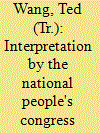

|
|
|
|
|
| Publication |
2012.
|
| Summary/Abstract |
The article focuses on the interpretation of the Basic Law of the Macao Special Administrative Region of China's Article 7 of Annex 1 and Article 3 of Annex 2. It cites the decision of the National People's Congress (NPC) Standing Committee that amendments must be made with the recommendation of a majority of the Legislative Council members. It adds that the amendments will only take effect if they pass various procedures approved by the Standing Committee.
|
|
|
|
|
|
|
|
|
|
|
|
|
|
|
|
| 6 |
ID:
116563
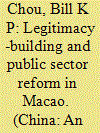

|
|
|
|
|
| Publication |
2012.
|
| Summary/Abstract |
Public sector reform has been an important strategy for the Macao government to build up its legitimacy since the handover of sovereignty. This article outlines the background of the legitimacy crisis that can be traced back to the administrative problems during the colonial era. Public sector reform in the post-handover era can be divided into two phases. Remarkable legitimacy-building was evident during the first phase of the reform that focused on the technicality of administrative efficiency and work performance. With a looming crisis of legitimacy in 2006, the Macao government continued to rely on the reform of the technical aspects of the administration by taking the approach of wider public consultation in the second phase of the reform. What have been left unreformed are the institutional shortcomings that hold back public participation and weaken the autonomy of public administration. The cause of the legitimacy crisis starting in the mid-2000s was the failure to introduce wider public involvement in public affairs and the maintaining of limited administrative autonomy. The path dependence of the second phase of the reform can hardly tackle the key factors of the new legitimacy crisis.
|
|
|
|
|
|
|
|
|
|
|
|
|
|
|
|
| 7 |
ID:
152984


|
|
|
|
|
| Summary/Abstract |
By examining the origins of Macao’s 2014 protest against the Retirement Package Bill, this paper intends to answer whether Macao is encountering a governance crisis like Hong Kong’s. Through a careful comparison, it concludes that Macao and Hong Kong are unlikely to follow the same political development trajectory, as there are considerable differences in the level of social mobilization and governmental coercive capacity between the two cities.
|
|
|
|
|
|
|
|
|
|
|
|
|
|
|
|
| 8 |
ID:
091847


|
|
|
|
|
| Publication |
2009.
|
| Summary/Abstract |
Macao's economic prosperity until recently had been dramatic thanks to astonishing expansion of the gaming and tourism sector. However, Macao's casino revenue growth came to halt in the second half of 2008 due to the twin blow of a deteriorating global economy and Mainland china's imposition of tighter visa restrictions on Chinese visitors to Macao.
|
|
|
|
|
|
|
|
|
|
|
|
|
|
|
|
| 9 |
ID:
129300
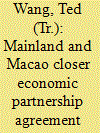

|
|
|
|
|
| Publication |
2012.
|
| Summary/Abstract |
The article offers information on the economic partnership agreement between Macau, China and the Mainland. It says that the deal aims to boost trade and investment collaboration between the regions, as well as promote the development of the parties. It says that the two parties are expected to recognize that the economic system of the Mainland has improved, while its management and production met the requirements of the economy.
|
|
|
|
|
|
|
|
|
|
|
|
|
|
|
|
| 10 |
ID:
138445
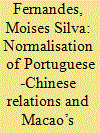

|
|
|
|
|
| Summary/Abstract |
Although many people believe that small or medium powers tend to be very concerned with overseas territories, this was not true in the case of Macao. The great power, mainland China, showed very little interest in foreign affairs, because it knew that the outcome of the handover would be in its favour. Nonetheless, from May 1974 to July 1975, both China and Portugal had to demarcate their positions. The Portuguese entered into informal conversations with the Chinese ambassador to France, Zeng Tao, in August 1975, which lasted until January 1978, a total of almost three years. As soon as power in mainland China shifted from the leftists to the moderates, however, the new ambassador in Paris, Han Kehua, made it clear that he wanted things settled in six months. However, in 1978, the Portuguese cabinet had three different prime ministers and three different ministers of foreign affairs. Ultimately, the Portuguese cabinet had to give in to mainland China, on 8 February 1979.
|
|
|
|
|
|
|
|
|
|
|
|
|
|
|
|
| 11 |
ID:
080485


|
|
|
|
|
| Publication |
2007.
|
| Summary/Abstract |
Since the return of Hong Kong's sovereignty to the People's Republic of China, the territory's political development has diverged from that of Macao. The poverty of leadership, state-society confrontations, deinstitutionalization and Beijing's explicit intervention have marked Hong Kong's political development from 1997 to 2004. Since April 2004, the Hong Kong governing style has converged with that of Macao in terms of its pragmatism. Although Macao's political development is characterized by leadership finesse, state-society partnership and institutionalization, its relatively weak civil society and lack of democratic reforms are by no means an attractive 'one country, two systems' model to Taiwan; nor does Hong Kong's 'one country, two systems' appeal to the Republic of China. Yet, the political corruption and chaos that punctuate Taiwan's democracy have failed to have any positive demonstration effect on Hong Kong and Macao. While the models of Hong Kong and Macao are bound to diverge from that of Taiwan, political development in the two Chinese Special Administrative Regions is gradually converging.
|
|
|
|
|
|
|
|
|
|
|
|
|
|
|
|
| 12 |
ID:
153689
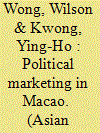

|
|
|
|
|
| Summary/Abstract |
To what extent can political marketing narrow the legitimacy gap for a hybrid regime? This article examines this question through the case of Macao (2009–14). It finds that political marketing is insufficient to compensate for lack of democratic reform and may easily backfire to expose the problem of a structural legitimacy deficit.
|
|
|
|
|
|
|
|
|
|
|
|
|
|
|
|
| 13 |
ID:
111680
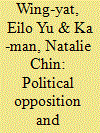

|
|
|
|
|
| Publication |
2012.
|
| Summary/Abstract |
This article examines the nature of political opposition in the Macao Special Administrative Region (MSAR) to give us an understanding of its role in and approach to political reform in the territory. It explores the emergence of the pro-democracy opposition in Macao since the end of the colonial era and the self-perception of pro-democratic opposition groups in the MSAR regime, and argues that the majority of opposition groups perceive themselves as 'loyal' opponents to the current regime. The groups aim at checking the authorities in the scope of the constitution as loyal constituents. Their assumption of this role is the result of several environmental factors, including a relatively weak civil society, a lack of resources and a pro-government media.
|
|
|
|
|
|
|
|
|
|
|
|
|
|
|
|
| 14 |
ID:
138446
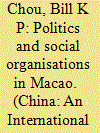

|
|
|
|
|
| Summary/Abstract |
Major social organisations in Macao fulfil the political and social functions of political mobilisation and participation, the provision of social services on behalf of the government and the co-optation of social forces by being the agents of the Chinese government in the execution of its united front policy and the vehicles of the Macao government for winning supporters. From the perspective of historical institutionalism, Macao’s political design, which centres on social organisations and dates back to the Portuguese era, is path-dependent on the modified corporatist model. By embedding social organisations into its political institution, the state can mobilise social forces to undertake state functions and weaken political opposition. Major social organisations face major challenges in their conflicting political and social functions, which weaken their ability to fulfil the role of the government’s partners and allies.
|
|
|
|
|
|
|
|
|
|
|
|
|
|
|
|
| 15 |
ID:
136295
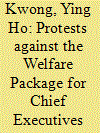

|
|
|
|
|
| Summary/Abstract |
In recent years, a series of social protests such as the “Sunflower Student Movement”inTaiwan and the “Umbrella Movement”in Hong Kong have sparked concerns over the political atmosphere in the Greater China Region.Compared withTaiwan and Hong Kong,the people of Macao have long been considered politically apathetic,with a low level of political awareness and efficacy. When asked whether they would oppose the government if their interests had been seriously infringed, around 40% of respondents chose to remain silent, perhaps out of a desire for“social harmony,”whereas 92.1% had no experience of engagement in any social movement. (1) It therefore came as a surprise when 20,000 people took to the streets on 25 May 2014 to protest against a bill that would have given generous benefits packages to outgoing Chief Executives (CEs) and top officials. In what was regarded as the biggest march since the 1999 handover, this exceptional scenario reveals the existence of a civic culture among the youth of Macao.
|
|
|
|
|
|
|
|
|
|
|
|
|
|
|
|
| 16 |
ID:
181411


|
|
|
|
|
| Summary/Abstract |
This article analyzes acts of the People's Bank of China (PBoC) and the Macao Monetary Authority. It shows that the recognition of initial coin offerings (ICO) as illegal financing and the ban on the use by financial organizations of tokens and cryptocurrency in transactions are measures aimed at preventing corruption and criminal money laundering. Hong Kong, unlike mainland China and Macao, partially regulates digital financial assets. Although tokens and cryptocurrency resemble securities or futures, their circulation belongs to the legislative scope of the securities market; otherwise, transactions with them are unregulated and investors have no protection.
|
|
|
|
|
|
|
|
|
|
|
|
|
|
|
|
| 17 |
ID:
097728
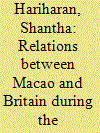

|
|
|
|
|
| Publication |
2010.
|
| Summary/Abstract |
This brief article, based on archival research, demonstrates how the various European mercantile and colonial powers fought proxy wars in Asia which endangered the early beginnings of British possessions in South Asia and risked the wrath of China. The article outlines an aborted attempt by the British to land troops in Macao to protect emerging British trade interests in the region and examines the reasons for this failed endeavour.
|
|
|
|
|
|
|
|
|
|
|
|
|
|
|
|
| 18 |
ID:
058300
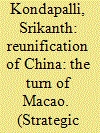

|
|
|
| 19 |
ID:
124158
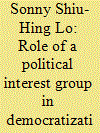

|
|
|
|
|
| Publication |
2013.
|
| Summary/Abstract |
The Hong Kong Alliance in Support of Patriotic Democratic Movements of China (HKASPDM) is a cross-border political interest group advocating for democratization in both mainland China and Hong Kong. It was involved in the bold rescue of mainland democrats out of the PRC shortly after the June 1989 Tiananmen crackdown; it constantly exerts pressure on the PRC government to release its political prisoners; it has been influencing the Hong Kong government on the scope and pace of democratization; it communicates with and subsidizes overseas Chinese groups supportive of democratic reforms in China; it is persistently educating the younger generations of Hong Kong and most importantly mainland visitors to Hong Kong on the 1989 Tiananmen tragedy; and its supporters have attempted to cross the border of Hong Kong to Macao to influence the policy of the Chinese government toward political prisoners. As a political interest group based in Hong Kong with cross-border influences on both the mainland and Macao, the Alliance has been making full use of the available political space and freedom of assembly in Hong Kong to achieve their ultimate objective of having a 'democratic China'. Its existence in the HKSAR is an indication of a certain degree of political tolerance by both the Hong Kong government and Beijing, which have to be very careful of the need to maintain an image of the feasible formula of 'one country, two systems' in Hong Kong.
|
|
|
|
|
|
|
|
|
|
|
|
|
|
|
|
| 20 |
ID:
138448
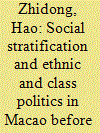

|
|
|
|
|
| Summary/Abstract |
This article examines the changes in ethnic and class politics before and after the handover of Macao in 1999. Even though the domination of Macao politics has largely transferred from the Portuguese and Macanese to the Chinese, the former two groups still retain much power in the legal arena. The Chinese upper class played an instrumental role in Macao politics before the handover and became fully dominant after 1999. For example, they have maintained a large presence on the Executive Committee and in the Legislative Assembly, successfully prevented further democratisation, and protected their interests by delaying the legislation of a minimum wage and barring the collective bargaining power of workers. The working class’ main interests fall in the area of wage increases and protecting their jobs from imported labour. However, they would occasionally join forces with the middle-class movement for democratisation. This article uses statistical data from various sources and applies the critical approach in sociology, namely, historical-comparative analysis, to the study of ethnic and class politics. This analysis will shed light on a scarcely studied issue in Macao and its future prospects of democratisation.
|
|
|
|
|
|
|
|
|
|
|
|
|
|
|
|
|
|
|
|
|